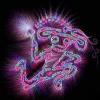Blue Light May Be Better Than Coffee for Boosting Brain Power

As you probably already know, caffeine, especially when taken at the right time, boosts alertness and can improve your focus. New research suggests, however, that you could get even better brain benefits and more energy from being exposed to blue light.
Swedish researchers tested a group of 21 volunteers' psychomotor and cognitive functions under four different conditions: exposed to white light and taking 240 mg of caffeine, blue light and 240 mg of caffeine, white light and a placebo, and blue light and a placebo.
They found that both the caffeine-only group (under white light) and the blue light-only group (no caffeine) had better accuracy on a visual reaction test that required making a decision—and they also performed faster than the other two groups. Their overall psychomotor function was better than the other groups as well.
The blue light-only group, however, did even better than the caffeine group on staying focused and being accurate when faced with different distractions. They also had substantially better visual reaction.
Other research has linked blue light with being more alert during the dreaded mid-afternoon slump and even improvingbrain activity in blind patients.
So those blue lightbulbs not only look cool, they may help you work better too.
A Comparison of Blue Light and Caffeine Effects on Cognitive Function and Alertness in Humans (Abstract) | PLOS One via Natural News
Photo by Serge Saint.
http://lifehacker.co...rain-1472598981



















































